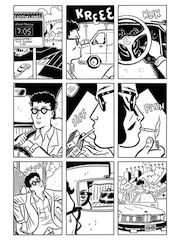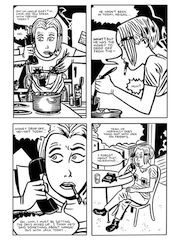![]() Clover Honey by Rich Tommaso
Clover Honey by Rich Tommaso
 Clover Honey by Rich Tommaso is a re-release of his first graphic novel, originally published in 1995, when Tommaso was twenty-three-year-old. I’ve never read anything quite like it. It’s a quick read — I think it took me all of forty-five minutes to read it — but I think it’s going to stay with me for some time to come. And I’m sure I’ll return to it. My initial impression is four stars, but I think with time I’d be willing to go higher. I suspect that the more time I spend with the book and thinking about it, the more it will grow on me.
Clover Honey by Rich Tommaso is a re-release of his first graphic novel, originally published in 1995, when Tommaso was twenty-three-year-old. I’ve never read anything quite like it. It’s a quick read — I think it took me all of forty-five minutes to read it — but I think it’s going to stay with me for some time to come. And I’m sure I’ll return to it. My initial impression is four stars, but I think with time I’d be willing to go higher. I suspect that the more time I spend with the book and thinking about it, the more it will grow on me.
Clover Honey is a black-and-white slice-of-life story that deals with the everyday concerns of a young woman named Abigail. As the story continues and as we learn more about her family — her mother and her uncle and so on — we realize that her family has mob connections. To Abigail, her everyday concerns are quite mundane and routine, but to us, it’s a bit odd to hear a discussion of whether she should have shot somebody or not. Her concern is whether her uncle will be angry with her; surprisingly, the police aren’t really a factor. Nor are ethics, laws, or morality of any kind. Her uncle is her boss, and maybe she isn’t doing what a good employee should do. But that’s okay, because her pal Trevor’s gonna put in a good word for her, or so he tells her as he drops her off at her place.
 Next scene: Trevor’s at the horse races holding a black bag. The horses are coming in for a close call, and it’s Clover Honey in first. Trevor looks very nervous: He’s sweating buckets. But what on earth is going on? It’s all very Alfred Hitchcock (North by Northwest is mentioned even). The next time we see Abigail she’s trying to track down Trevor; in fact, it seems like a lot of people are trying to track down Trevor.
Next scene: Trevor’s at the horse races holding a black bag. The horses are coming in for a close call, and it’s Clover Honey in first. Trevor looks very nervous: He’s sweating buckets. But what on earth is going on? It’s all very Alfred Hitchcock (North by Northwest is mentioned even). The next time we see Abigail she’s trying to track down Trevor; in fact, it seems like a lot of people are trying to track down Trevor.
The rest of the story moves between Trevor’s activities and Abigail’s attempts to locate him. We don’t find out too much about Trevor, but Abigail tells us about her family and her closest relative, her cousin Patty, who always seemed to be the one in competition with her. Abigail’s view of her cousin and the hardships her cousin eventually endured become the central focus of Abigail’s story, even though it seems such a minor detail. Abigail, her hard-boiled side finally coming out as the mobster in her snarls at Patty, comes to a realization about her perception and the reality of her cousin’s life, an epiphany that may sound minor if I were to write it in a review (which, of course, I won’t), but which is really the heart of the story. Abigail’s realization is what sets her in motion and leads up to an understated dramatic ending, as paradoxical of a description as that may seem.
 I guess I cannot think of a better description for this graphic novel than those two words: understated drama. Whereas most hard-boiled fiction is over-the-top, Clover Honey is the exact opposite. It’s Mickey Spillane turned inside out, and I like it far better than Mickey Spillane. As I finish this review, I realize I’ve talked myself into a 4.5/5 star review, and if I write more, I might even give it five stars. I certainly wouldn’t argue with anybody who would rate it five stars. The art, too, is straight-forward and understated. It has a classic, noir feel at times and an “indie comic” feel to it at others, which fits perfectly the blended content I’ve been trying to describe. If you like noir at all and are tired of all the clichés, give Clover Honey a chance and see what a noir narrative looks like without the clichés. And luckily, like the best noir, Clover Honey still ends with a well-earned, powerful punch to the gut. You just won’t be fully prepared for it, even with my warning.
I guess I cannot think of a better description for this graphic novel than those two words: understated drama. Whereas most hard-boiled fiction is over-the-top, Clover Honey is the exact opposite. It’s Mickey Spillane turned inside out, and I like it far better than Mickey Spillane. As I finish this review, I realize I’ve talked myself into a 4.5/5 star review, and if I write more, I might even give it five stars. I certainly wouldn’t argue with anybody who would rate it five stars. The art, too, is straight-forward and understated. It has a classic, noir feel at times and an “indie comic” feel to it at others, which fits perfectly the blended content I’ve been trying to describe. If you like noir at all and are tired of all the clichés, give Clover Honey a chance and see what a noir narrative looks like without the clichés. And luckily, like the best noir, Clover Honey still ends with a well-earned, powerful punch to the gut. You just won’t be fully prepared for it, even with my warning.



It sounds like it focuses more on psychological growth than external action and violence. I was waiting to see how the name fit in — nice one!
Thanks for your comment, Marion!
I’ll certainly be reading more by this author . . .